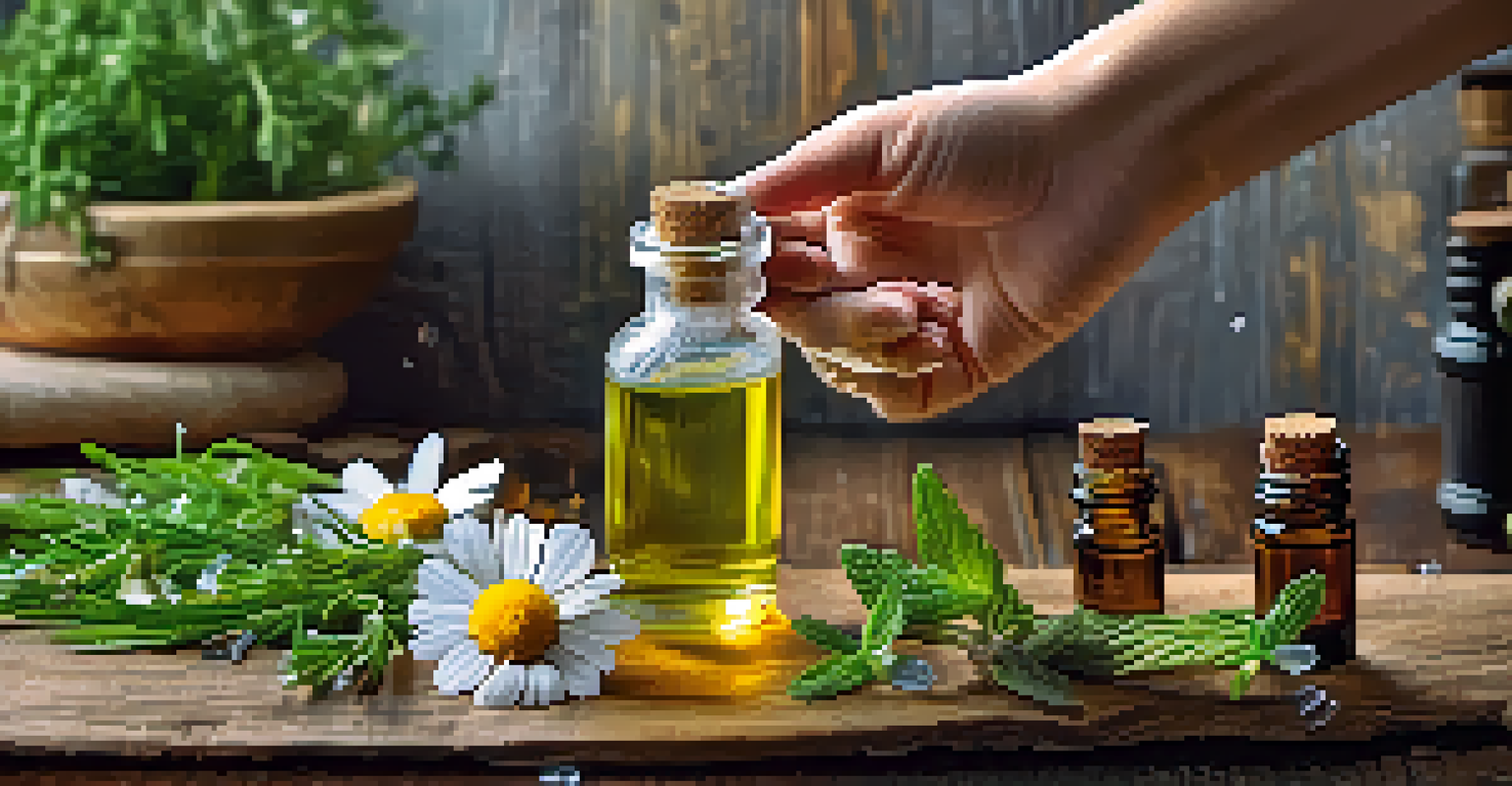The Role of Essential Oils in Emotional Resilience

Understanding Emotional Resilience and Its Importance
Emotional resilience refers to our ability to adapt and bounce back from life's challenges. Just like a rubber band, resilient individuals can stretch under pressure but return to their original shape. This quality is crucial, especially in today's fast-paced world, where stressors are abundant.
It's not the load that breaks you down, it's the way you carry it.
Building emotional resilience helps us manage stress, maintain mental health, and navigate difficult situations with a clearer perspective. It equips us with coping strategies that promote well-being and emotional stability. Having this resilience can make a significant difference in how we experience life's ups and downs.
Essential oils can play a supportive role in enhancing emotional resilience. By harnessing the power of nature, we can create an environment that fosters healing, calm, and balance, making it easier to withstand life's emotional trials.
How Essential Oils Affect Our Emotions
Essential oils are more than just pleasant aromas; they influence our emotions through the olfactory system, which is directly linked to the brain's limbic system. This area is responsible for our emotional responses and memory. When we inhale these fragrant oils, we can trigger feelings of calm, happiness, or even energy.

For instance, the scent of lavender is often associated with relaxation, while citrus oils like orange can uplift your mood. This direct connection means that a simple act, like diffusing a calming essential oil, can create a significant shift in your emotional state.
Emotional Resilience Defined
Emotional resilience is our ability to adapt and recover from life’s challenges, much like a rubber band that stretches but returns to its original shape.
By understanding how essential oils interact with our emotions, we can intentionally choose specific scents to support our mental health. This knowledge empowers us to create an emotional toolkit that can be accessed whenever we need a boost.
Top Essential Oils for Emotional Resilience
Several essential oils are particularly effective for promoting emotional resilience. Lavender, for example, is renowned for its calming properties, making it a go-to choice during moments of anxiety or stress. Similarly, bergamot oil can help alleviate feelings of sadness and promote a sense of joy.
The greatest weapon against stress is our ability to choose one thought over another.
Another powerful oil is frankincense, which has grounding effects that can enhance meditation and mindfulness practices. Incorporating these oils into your daily routine can create a supportive atmosphere that encourages emotional balance.
Not only do these oils have emotional benefits, but they can also enhance your overall well-being. Using a blend tailored to your needs can serve as a daily reminder to care for your mental health.
Incorporating Essential Oils into Daily Life
Integrating essential oils into your routine can be simple and enjoyable. One effective method is to diffuse your chosen oils throughout your home or workspace. This continuous exposure helps create a calming or uplifting environment that supports emotional resilience.
Another way to use essential oils is by adding them to your bath or skincare routine. A few drops in your bathwater or mixed with a carrier oil for a massage can enhance relaxation and promote a sense of well-being.
Essential Oils Enhance Emotions
Essential oils interact with our emotions through the olfactory system, helping to promote feelings of calmness, happiness, or energy.
You can also carry a personal inhaler or rollerball with your favorite oil blends. This portable option allows you to access emotional support whenever needed, whether you're at work, in traffic, or facing a challenging situation.
Mindfulness and Essential Oils: A Perfect Pairing
Mindfulness practices, such as meditation or deep breathing, can be greatly enhanced with the addition of essential oils. When you engage your senses, the calming effects of oils become even more pronounced, creating a deeper connection to the present moment.
For example, diffusing chamomile oil during your meditation can promote relaxation and help you achieve a tranquil state. Similarly, using peppermint oil during mindful breathing can invigorate your senses and enhance focus.
By pairing essential oils with mindfulness, you're not only nourishing your emotional resilience but also fostering a holistic approach to your mental well-being.
Creating Your Personalized Essential Oil Blend
Crafting a personalized essential oil blend can be a fun and rewarding experience. Start by identifying your emotional needs—are you seeking calm, energy, or clarity? This self-reflection helps you select oils that align with your objectives.
Once you have your oils in mind, experiment with different combinations. A basic guideline is to use three to five different oils; start with a base note like cedarwood, add a middle note like lavender, and finish with a top note like lemon. This layering creates a well-rounded scent profile.
Personalized Oil Blends for Well-Being
Creating a personalized essential oil blend allows individuals to target their emotional needs and enhance their overall mental health.
Don't forget to document your blending process! Keeping a journal of your experiments can help you refine your recipes and discover what works best for your emotional needs.
Precautions When Using Essential Oils
While essential oils offer numerous benefits, it's essential to use them safely. Always dilute oils with a carrier oil before applying them to the skin to avoid irritation. Additionally, perform a patch test to check for allergic reactions.
Be cautious with certain oils during pregnancy or if you have underlying health conditions. Consulting a healthcare professional, especially when using oils for therapeutic purposes, is always a good idea.

Educating yourself about each oil's properties and potential contraindications can help ensure a safe and enjoyable experience as you explore the emotional benefits of essential oils.